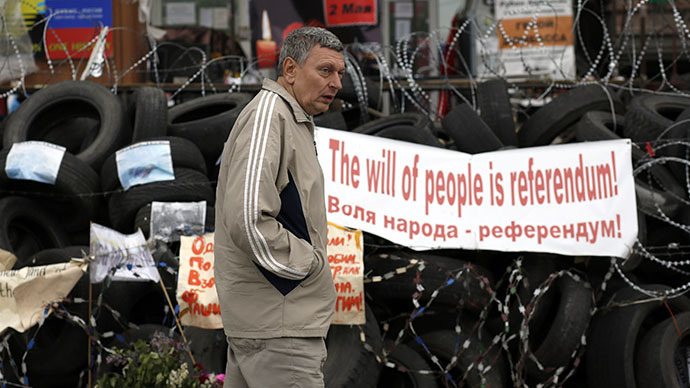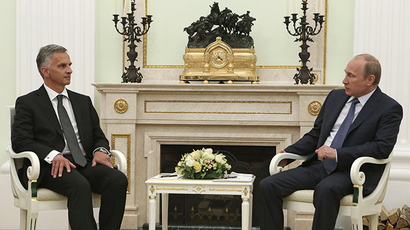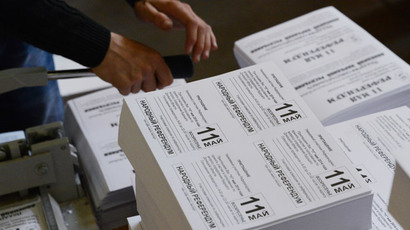E. Ukraine’s regions gear up for independence referendums

Ukraine’s self-proclaimed people’s republics of Donetsk and Lugansk are making last preparations for May 11 referendums on the status of the regions, despite Russia calling for a delay of the votes and France and Germany labeling them “illegal”.
Voters in the two south-eastern regions will be asked if they “support the Act of state self-rule” of the Donetsk People's Republic or Lugansk People's Republic respectively.
Organizers of the Donetsk referendum say they have printed over 3 million ballot papers and set up over 1,500 local election commissions. All in all, they have spent just about 20,000 hryvnas (US$ 2,000) preparing for the vote in Ukraine’s industrial region, the heart of the country’s coal-mining.
“We get no support from Russia,” Roman Lyagin, the head of the self-proclaimed republic’s election commission told reporters on Saturday, cited RIA Novosti.
“The referendum will be considered valid whatever voter turnout will be,” he added, according to Itar-Tass.
#Donetsk prepares for tomorrow's referendum - polling station pic.twitter.com/2J3pZ3ZYoL
— PaulaSlier_RT (@PaulaSlier_RT) May 10, 2014
Voter rolls from the 2012 parliamentary election will be used on Sunday since officials blocked access to up-to-date voter registers. However, organizers say that they have formed additional lists so that those who have reached voting age within past two years will also be able to express their opinion.
Not a single international observer has filed an application to monitor the Donetsk “republic’s” plebiscite, Lyagin said.
“We haven’t refused anyone, we simply received no requests,” he said, adding that public control over the voting process could therefore be carried out by journalists. As of Saturday, over 470 reporters have accreditation to cover the upcoming event.
Polling stations will be open from 8:00 local time (5:00 GMT) and close at 22:00 (19:00 GMT). In Slavyansk the stations will close earlier, at 15:00 GMT for security reasons, according to Lyagin. The town has lately been the epicenter of violent clashes between the Ukrainian military and anti-government activists.
If a majority of voters answer “yes” on Sunday, it will give Donbas (Donetsk Basin) a right for self-determination, the head of the “republic’s” election commission explained.
“It would not mean that the Donetsk region would become part of Russia, or remain within Ukraine or become an independent state. It means only one thing – that we would win the support of the majority of the population of the region and gain a moral right to state that were are not happy with what is happening in the region and demand changes,” Lyagin said.
#Donetsk prepares for #referendum - one of many polling stations pic.twitter.com/t7w6rjpV0j
— PaulaSlier_RT (@PaulaSlier_RT) May 10, 2014
Meanwhile, in Donetsk’s neighboring self-proclaimed People’s Republic of Lugansk, organizers have sent out 1.8 million invitations for people to take part in the referendum and set up 1471 polling stations.
“According to a survey, 83 % of Lugansk residents are ready to support the Act of state self-rule of the People’s Republic of Lugansk,” the head of the local election commission, Igor Shakhov told Interfax.
Unlike in Donetsk, as many as 36 international observers have voiced their readiness to monitor the referendum on independence in Lugansk, organizers say. So far, only Canadian observers have arrived, according to self-defense activist Vasiliy Nikitin. In his words, Ukrainian authorities will not let monitors from Russia and Kazakhstan into the country.
The Russian State Duma, the lower house, said earlier it was not going to send monitors to the referendums in Ukrainian regions. Senators from the upper house, the Federation Council, are not going to be present either.
It is not yet clear when the results of the voting in the regions will be announced. An activist from Lugansk self-defense squads, Vasiliy Nikitin told journalists that they will manage to count the votes “by May 13 at the latest.” Pro-autonomy activists in Donetsk could not say when their results will be counted.
Donbass ! Republic! Referendum! Thousands march in #Donetskpic.twitter.com/P9Z0NuxzzT
— Roza Kazan (@rozakazancctv) May 9, 2014
German Chancellor Angela Merkel and French President Francois Hollande said that they consider the upcoming voting on independence from Kiev “illegal”.
The European leaders urged Kiev authorities to launch a national dialogue with all regions before the presidential vote on May 25, and to open to the demands of protesters in eastern regions, including a constitutional reform plan which would guarantee ethnic minority rights and open the door to the decentralization of power in Ukraine.In a joint statement Saturday they also said that Kiev should present plans for constitutional reform “in the coming days,” Reuters cited.
Kiev - where anti-government activists are described as “separatists” and “terrorists” – has repeatedly said it would not recognize the results of the referendum. At the same time, acting Ukrainian President Aleksandr Turchinov assured that authorities “hear Donbas” (Donetsk Basin) and are ready to negotiate. Talking on the Shuster Live program on Ukrainian TV, he said that “federalization of eastern Ukrainian regions would be a self-destruction” and a “step to the abyss”.
However, authorities in the People’s Republic of Donetsk said that a dialogue would only be possible when the Kiev government stops their aggression and withdraws military forces from the region.
“I personally do not think that Kiev want a peaceful solution to the crisis. So far, we have seen that they only want its escalation,” a co-chair of the republic’s government Miroslav Rudenko told Interfax.
Since mid-April, Kiev has been carrying out a military operation against anti-government activists in the south-eastern region, which has already resulted in bloody clashes and deaths among civilians.














